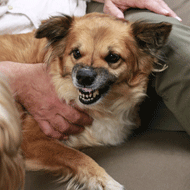Why some dog owners use punishment to deal with aggression

The study highlighted the potential for extreme negative emotional responses and feelings of failure in the dog owner when their dog shows aggression.
Bristol scientists have explored the factors affecting whether dog owners use positive or negative training methods to deal with aggression in their pets.
Current evidence suggests that positive reinforcement techniques are a humane and effective way to treat aggressive behaviour, whereas punishment-based methods are likely to impact welfare and potentially increase aggression levels. Yet many owners continue to use these outdated techniques.
Researchers from the University of Bristol wanted to find out why some owners still use punishment methods, and what the barriers and drivers are for using positive reinforcement.
Their findings, published in the journal Risk Analysis, suggest that key factors are the owner’s perception of how effective the behaviour modification will be, as well as their own ability to apply them.
The research team concluded that clinical behaviourists should focus on helping dog owners to feel confident about the effectiveness of the techniques they recommend and in their ability to use them successfully.
In addition, the study highlighted the emotional impact of managing a reactive dog and the potential for extreme negative emotional responses and feelings of failure in the dog owner when their dog shows aggression. Dr Emily Blackwell, from Bristol Veterinary School, said it is important for practitioners to consider the wellbeing of the owner as well as the dog.
She added: “Our findings highlight the need for behaviourists to offer practical support to owners, to demonstrate the effectiveness of reward-based training and to provide them with an opportunity to practice under expert guidance, so that they feel confident in their ability to use the techniques before attempting to apply them independently.”
Dr Emily Williams, from Bristol’s School of Psychological Science, said: “The majority of research on companion animal behaviour has focused on the behaviour of the animal itself, rather than the behaviour of the owner. We believe this is the first time that psychological theories exploring how people respond to threatening situations, such as Protection Motivation Theory, have been applied to understand people’s interactions with their pets.”
The study provides a foundation for future research exploring the influence of different psychological factors on an owner’s decision to use positive reinforcement techniques to manage aggressive behaviours.



 The RCVS has announced a new version of its 1CPD mobile app, with enhanced features for veterinary surgeons and veterinary nurses to record their continuing professional development.
The RCVS has announced a new version of its 1CPD mobile app, with enhanced features for veterinary surgeons and veterinary nurses to record their continuing professional development.